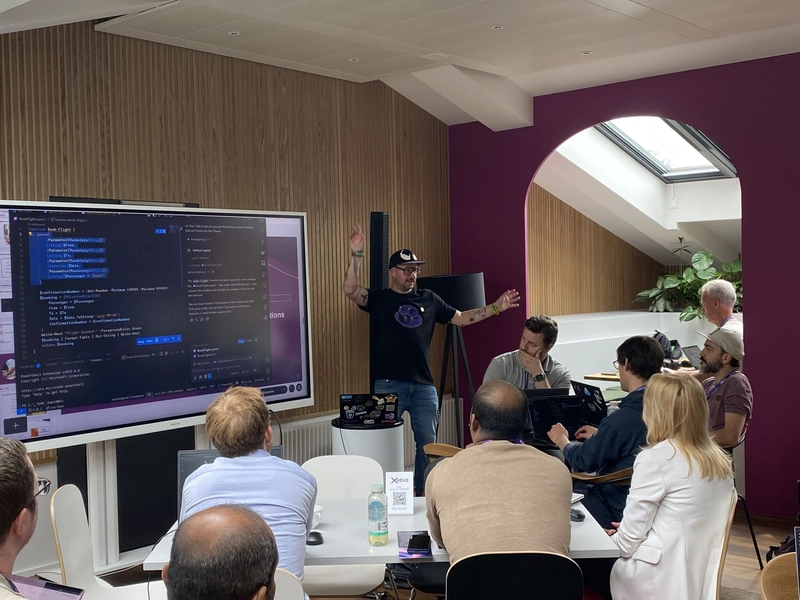But at some point, I realized I was craving something else: stability. Not the slow-and-steady kind, but the kind that gives you room to grow without having to wear 10 hats at once. That’s when I found Xebia — or maybe, Xebia found me. I saw their team in action at GitHub Universe and something clicked: this wasn’t just another consultancy. The passion, the spirit, the way they talked about tech, I felt like I belonged even before I joined.
Still, I was nervous. I didn’t really know what to expect.
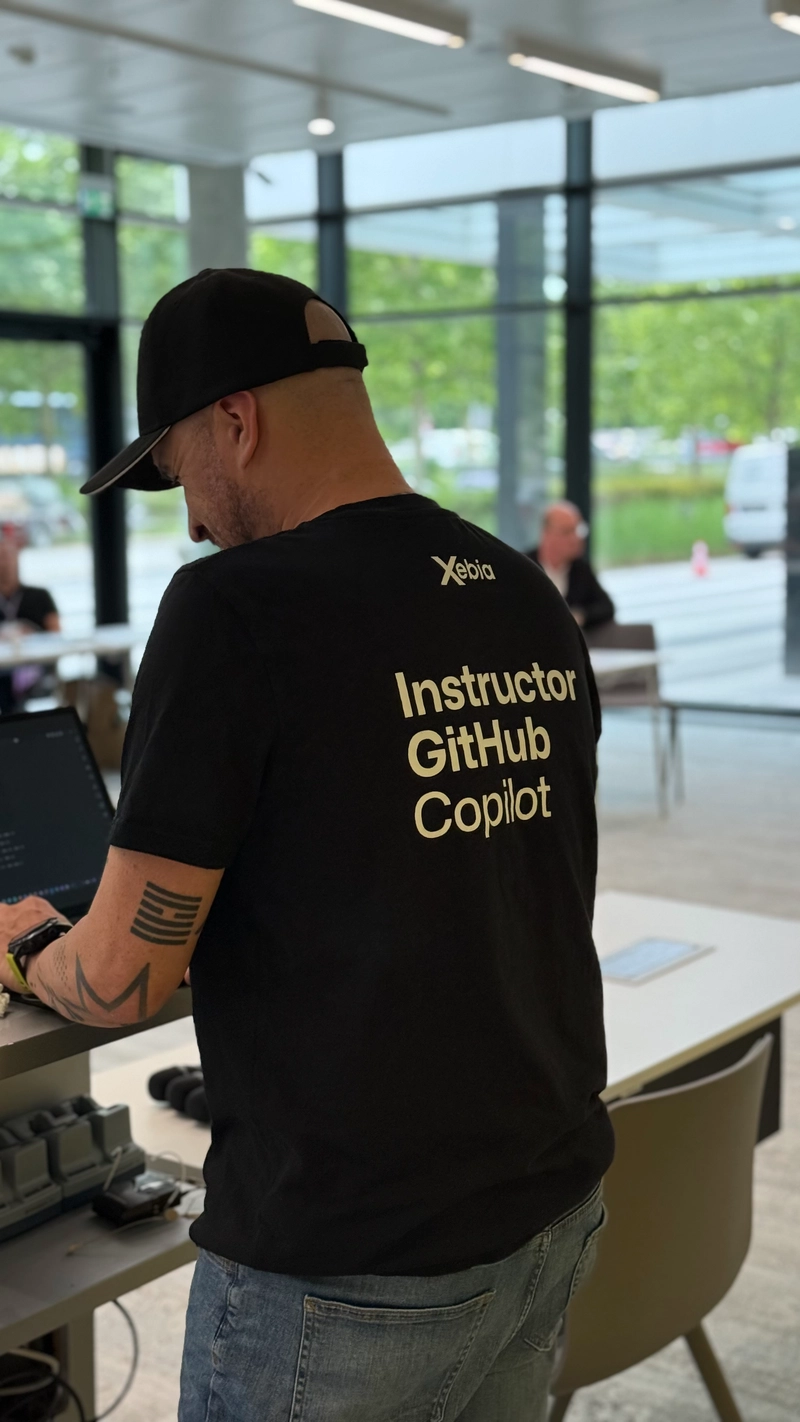
Fast forward three months, and I’m leading a GitHub Copilot Hackathon in our Zurich office, speaking at public events, and helping customers modernize their DevOps practices with AI and GitHub. The ride has been intense, eye-opening, and genuinely rewarding.
This post is a reflection on what I’ve learned, what surprised me, and how I’m finding my place in a new environment — one that feels both structured and empowering.
Let’s dive in.
Leaving the Startup World
When you run your own startup, every day feels like controlled chaos — and sometimes without the "controlled" part. You switch from writing code to pitching investors to debugging late-night incidents, all before your second redbull or something like that. It’s intense, but it teaches you everything.
That’s exactly what the last few years were for me: a crash course in building products (even if it's not the first product I built), understanding users, managing uncertainty, and connecting with incredible people. If I hadn’t taken the startup path, I wouldn’t have grown nearly as much, professionally or personally.
So no, I didn’t leave the startup world because I didn’t like it. I left because I needed something different. After years of sprinting, I wanted space to breathe. Space to focus. Space to go deep instead of wide.
Xebia offered that space — and more. I didn’t join just any company. I joined a place where the craft of software engineering matters, where people care deeply about technology, and where sharing knowledge isn’t a nice-to-have, it’s a core value. From the moment I saw them at GitHub Universe, I felt like I could grow here.
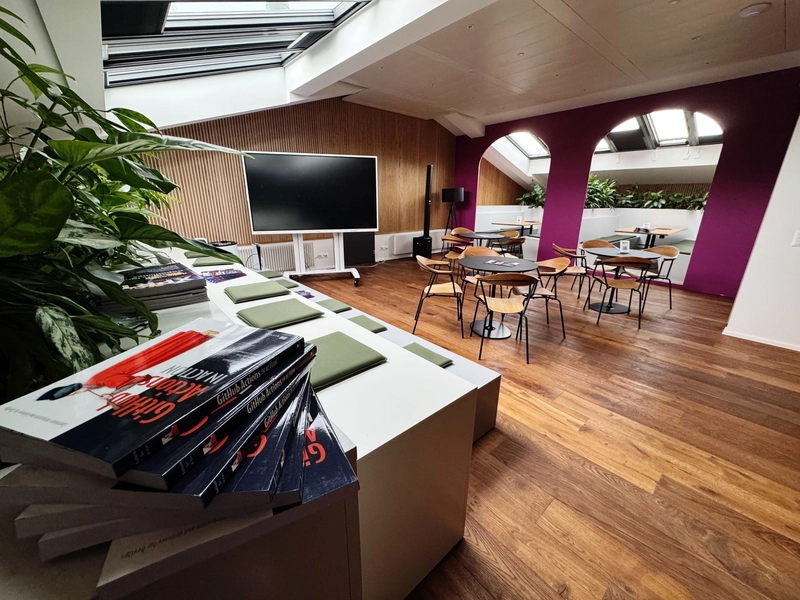
The First Week: Onboarding With Intention
You can usually tell a lot about a company from how they handle your first week, and honestly, my onboarding at Xebia couldn’t have gone smoother.
From day one, I felt genuinely welcomed. Not just with MS Teams messages or formalities, but with real conversations and a sense of ease from the people around me. Everyone I met was approachable, helpful, and — just as important — curious. Curious about what I brought to the table, about my experience, and how we could build things together.
I didn’t feel like I was being micromanaged, but I also wasn’t left in the dark.
What surprised me most was how intentional everything felt. There was clearly a culture of learning and sharing — not just internally, but also externally through events, blog posts, and open-source contributions. It wasn’t just about joining a company; it was about joining a community of technologists who actually cared.
That first week reassured me that I made the right choice.
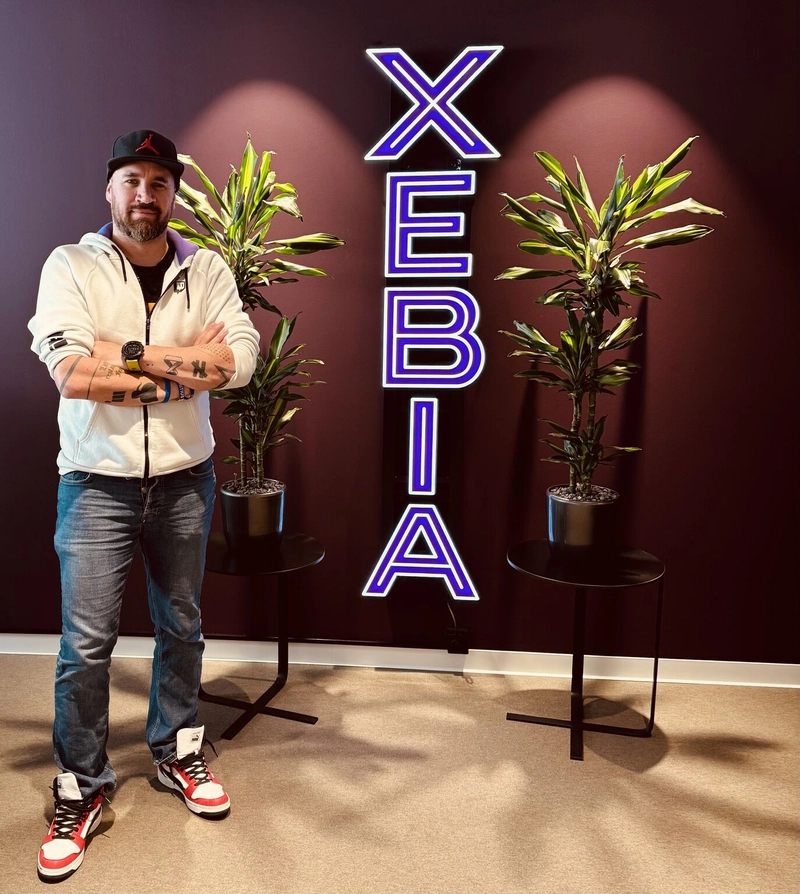
Learning at Lightspeed
Even with over two decade in the industry, changing environments forces you to learn fast, and that’s exactly what happened in my first few weeks at Xebia.
One of the first things I had to adjust was my pace. In a startup, everything is a race against time. You learn to deliver fast, fix things even faster, and sometimes compromise on elegance for survival. At Xebia, the pace is still high, but it’s purposeful. There’s space to think, space to refactor, space to do it right the first time. It took me a moment to realize I didn’t need to ship everything yesterday. That mindset shift alone was a big learning moment.
Technically, I dove straight into GitHub migrations, which are more nuanced than they seem from the outside. Each one is a mini-puzzle with unique requirements, legacy quirks, and organizational dynamics. I also got to contribute to AI-focused Proof of Concepts for potential customers — projects that mix cutting-edge tech with real-world business impact.
Working alongside deeply experienced colleagues also expanded my perspective. There’s a level of technical depth here that’s incredibly motivating. It’s not about knowing everything — it’s about being surrounded by people who push each other to grow.
Learning here doesn’t feel like homework. It feels like leveling up.
Culture Shock (In a Good Way)
Coming from a startup, I was used to chaos being the norm. So walking into Xebia’s culture felt like stepping into a different universe, in the best way possible.
One of the first things I noticed was the emphasis on autonomy. You're trusted to do your job well, but you're never left alone. There’s always someone willing to jump on a call, review your code, or just chat through an idea. That mix of independence and support is rare.
What really surprised me was how open and humble everyone is. There’s no ego flexing, no gatekeeping. Whether you’ve been here for a week or a decade, your ideas are heard. And it’s not just talk, it’s embedded in how teams work, how people interact, and how decisions are made.
At Xebia, sharing knowledge is not optional — it’s encouraged, celebrated, and expected. People publish blog posts, run internal sessions, organize community events. It’s part of the DNA.
For instance, after less then two months, I had the chance to write an article in our magazine.
I wrote an article about .NET Aspire and I am planning to write a new one about Foundry AI Local for the next issue of the magazine.
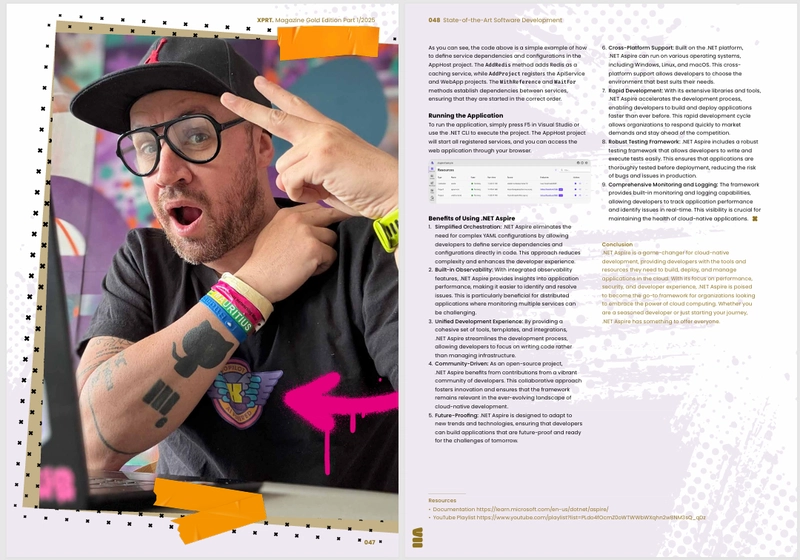
You can download the latest issue of the magazine here! This issue is a special edition for celebrating 10 years of knowledge sharing.
For me, that was a culture shock — because it proved that you can move fast and be kind, be excellent and be humble, build value and build people.
This isn’t just a place to work. It’s a place to grow.
Real Work, Real Impact
One of the things I appreciated most was how quickly I was trusted with real responsibilities. There was no “warm-up” period — the team was ready for me the moment I walked in.
In the first few weeks, I jumped straight into GitHub migrations for enterprise customers — not exactly beginner-level tasks. Each project came with unique challenges: legacy setups, complex permission structures, security concerns, and business-critical timelines. It was intense, but also exactly the kind of work I thrive on.
At the same time, I got to experiment on the frontier — working on AI-based Proof of Concepts for potential clients. Blending GitHub with AI isn’t just exciting; it’s meaningful. These PoCs weren’t just about showing what's possible, but helping customers envision how these tools could reshape their workflows.
Then came a big milestone: leading our first GitHub Copilot Hackathon in the Zurich office. It was surreal. Less than three months in, and I was already running an event, guiding teams, and watching people — some with zero coding experience — build working prototypes in a few hours. That moment hit me: I wasn’t just part of the team; I was making a difference.
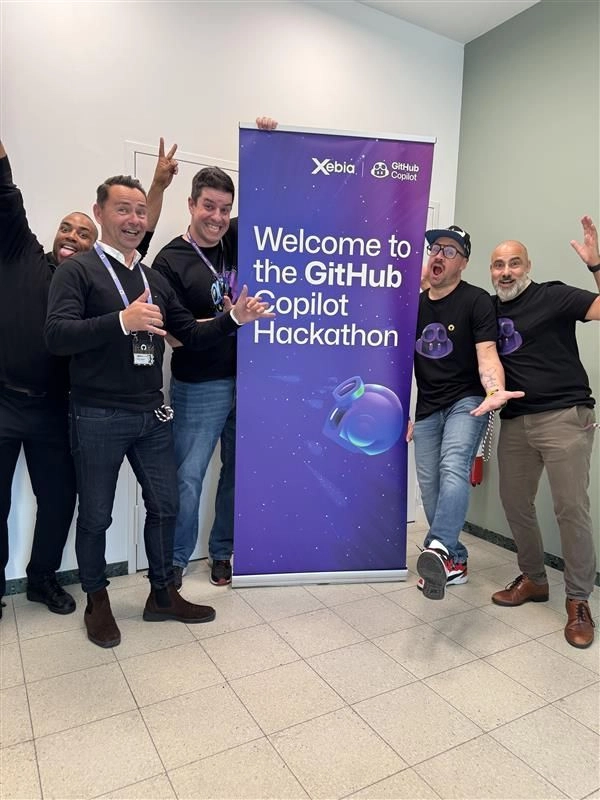
And just a few days before that, I had delivered my first public session as a Xebian — with more events and community engagements already lining up.
This level of impact, this early, was something I never expected. And I’m grateful for it.
From Solo Builder to Team Player
In a startup, you're used to being the architect, the developer, the DevOps engineer, the support guy — sometimes all in the same day. That chaos breeds creativity, but it can also wear you down. Shifting into a more defined role at Xebia felt strange at first — almost too quiet.
But then I started to appreciate the beauty of focus.
Here, I can go deep. I can specialize. I can spend time perfecting a solution without constantly switching hats. And more importantly, I can lean on others who are just as dedicated in their own areas. The collaboration here doesn’t feel like a handoff — it feels like playing in an orchestra where everyone’s tuned in.
Being part of a well-oiled team has taught me that structure doesn’t kill creativity — it amplifies it. When you're not stretched thin, you can bring your best self to the table.
And yet, the startup spirit never really leaves you. It’s still there — in the way I approach problems, in how I stay scrappy when needed, and in my desire to deliver value fast. But now, I have the backing of a strong team and the room to grow in new directions.
It’s not about losing autonomy — it’s about finding balance.
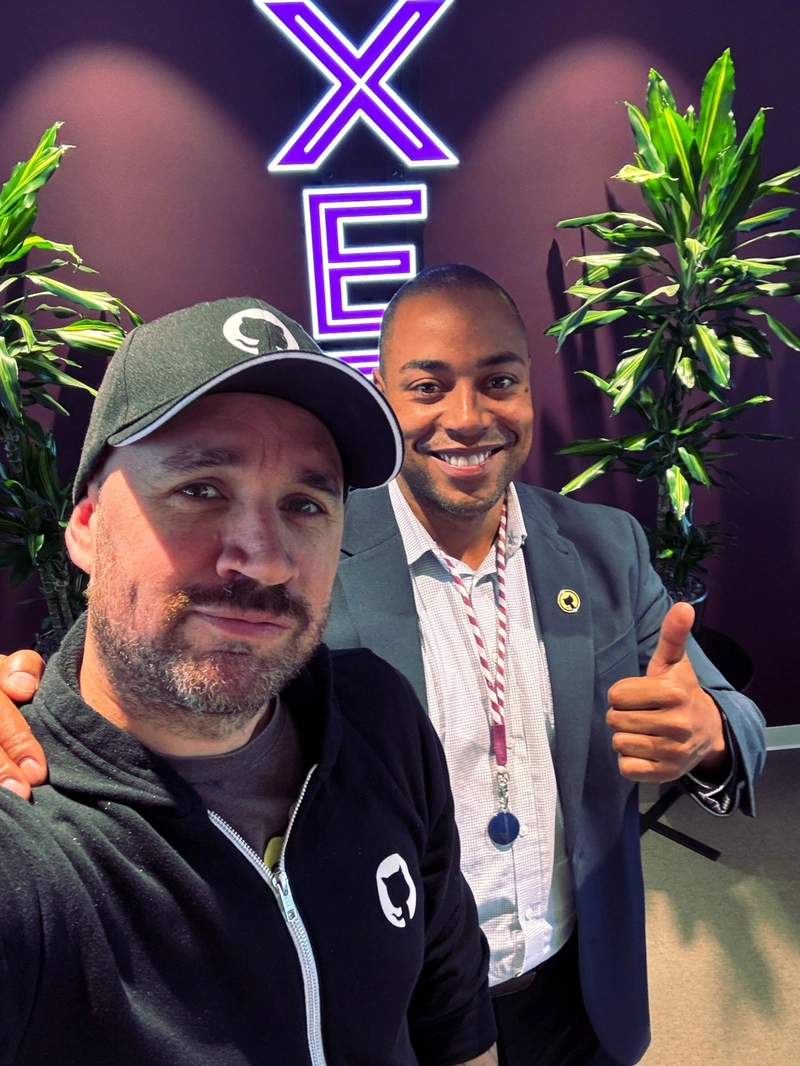
Looking Ahead
It’s only been three months, but it already feels like I’ve found a new rhythm, one that blends the energy of a startup with the maturity of a consultancy.
I’m excited about what’s next. More customer projects, more AI experimentation, more community events, and probably a few more hackathons too. I want to keep sharing what I learn — not just through code, but through talks, blog posts, and conversations with the tech community.
My goal for the next 3 to 6 months? Grow deeper into my role, amplify my impact, and stay curious. I want to help clients not just adopt tools like GitHub and Copilot, but truly unlock their potential. And I want to keep learning from the incredible people around me — because at Xebia, there’s no shortage of inspiration.
If you’re someone thinking about making a similar shift — from startup chaos to structured impact — here’s my advice: don’t see it as slowing down. See it as growing up in your craft. The speed might change, but the momentum? That’s entirely up to you.
